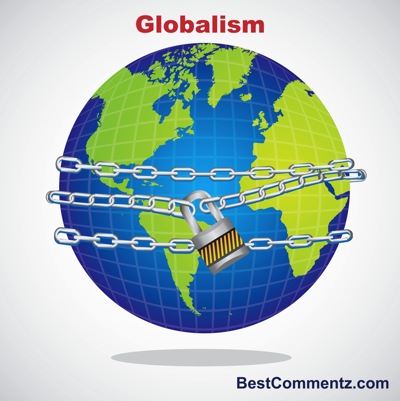|
The cacophony of globalism and globalization is becoming more confusing by the day. Both globalism and globalization are all too often defined in strictly economic terms as if the world economy as such defined globalism. But other forms are equally important. There are four distinct dimensions of globalism: economic, military, environmental, and social. Within these dimensions, if you are a person who believes in limited government, and that government is done better the closer it is to your home & social environment, then globalism just adds another layer of people who want to tell you how to live. Edward Ring offers us here an interesting perspective on this subject. |

If globalization is the economic integration of nations in a world where technology has all but erased once formidable barriers to long-distance communication and transportation, globalism is its cultural and ideological counterpart. In theory, the same dynamics might apply. As economies merge, cultures merge as well.
As we move deeper into the 21st century, a global melting pot blends everything and everyone together. A planetary civilization marches united into a future of peaceful coexistence, ecological restoration, human life extension, and galactic exploration.
If people were saints and reality utopia, this idealized version of globalism could be embraced without reservation. Globalism, like communism or neoliberalism, is beautiful when described in these abstract terms and not rooted in the real world. And there is a legitimate moral imperative for us to try to come to terms with what civilization will look like as technology continues to shrink the world. Technology makes globalization, in some ways, inevitable. But what ideology regulates globalization is a choice.
This is the lens through which to view the identity struggle that currently grips the United States and other Western nations. It clarifies what is at stake and points to the consequences of getting it wrong. Unfortunately, for reasons that are not hard to explain, people are not saints and reality is not utopian. Thus, the institutions currently defining policy in America are doing almost everything wrong. Their malpractice is pushing America into decline at the same time as it is alienating allies and empowering malevolent regimes. It must be corrected.
In two fundamental areas, the consensus of America’s elites, relentlessly escalated in policies imposed both by unelected administrators and elected officials, is horrifically wrong.
 The first of these concerns energy in particular, and more generally, environmentalism. These policies, which nations elsewhere on earth will not accept—to the point of being willing to go to war to stop them, if necessary—are going to strip Americans of freedom and prosperity if we continue to pursue them. That process is well underway.
The first of these concerns energy in particular, and more generally, environmentalism. These policies, which nations elsewhere on earth will not accept—to the point of being willing to go to war to stop them, if necessary—are going to strip Americans of freedom and prosperity if we continue to pursue them. That process is well underway.
In the name of saving the planet, Americans are being denied access to affordable energy, despite the fact that “renewables” are not only incapable of replacing oil, gas, coal, hydro, and nuclear power, but are even more destructive to the environment. In an attempt to reduce “greenhouse gas” emissions, Americans are being driven out of rural areas and into cities. In turn, America’s cities are prevented from expanding outward in order to prevent “sprawl.” Instead, people evicted from rural areas, along with millions of migrants from foreign nations, are packed via “infill” into multifamily, high-density apartments.
To express the scope of this transformation would require volumes. It is designed to eliminate America’s middle class and destroy small businesses. It extends into every economic sector—energy, water, food, transportation, housing, media, medicine. It is regulatory tyranny that only billionaire individuals and multibillion-dollar corporations can navigate. It centralizes power and cannot be administered without monitoring and micromanaging individual behavior. It is a dystopian nightmare, and it is quietly and systematically smothering what remains of free and economically independent Americans.
The other fundamental mistake America’s elites are promoting is the destruction of the meritocracy that, perhaps more than anything else, made America great. In the name of eliminating racism, sexism, and disproportionate outcomes for people with other identifiable group characteristics, merit and qualifications are being replaced by identity quotas. This, too, is rolling its way through America’s institutions.
Meritocracy, in the broadest sense of the word, is closely related to normality. It is normal to want the best-qualified people to fill positions. It is normal for social organizations, including businesses and government agencies, to best cohere when everyone is not only chosen for their competence, but for their acceptance of shared values and behaviors. Replacing normality with a celebration of abnormality, and replacing competence with quotas, as America’s institutions are doing, undermines the efficiency and the happiness of everyone involved. What’s left are implacable bureaucracies, vast and empty organizations without souls.
These mistakes are going to kill America. Energy poverty, environmentalist tyranny, and “equity” over competence; these choices are fatal. But these are merely surface phenomena. The bigger problem is that there is a collective soul that has defined Western civilization, developed over millennia, and is now warped and abandoned by America’s elites. It is dismissed as an anachronism and an impediment. But it is the source of America’s greatness and restoring it is the only solution to America’s current misdirection.
A recent essay by Cauf Skiviers—a provocative writer who was recently banned by Medium (you’ve been warned)—includes a paragraph that describes the foundations of Western civilization. For brevity, it’s as good as any. He writes:
The foundations of the West are anchored in the triad of Christianity, Greek philosophy, and Roman law. These pillars were not erected by a single, all-directing force, but rather were forged out of disagreement, wars, jealousy, and love. None of the elements necessitated any particular racial impetus. Much to the contrary. Christianity dispelled the notion of a ‘chosen people,’ extending salvation indiscriminately through faith. Rome, too, was built upon the bedrock of the Rule of Law, applicable to all. Greek philosophy was not concerned with the ‘lived experience’ of Athenians or the ‘spoken truth’ of Milesians, but rather with universal values.
The relevance of this paragraph is in its appeal to everyone, everywhere in the world. Salvation indiscriminately through faith. The rule of law is applicable to all. Universal values. What this heritage gave rise to was a nation that even now remains an inspiration. A nation where individuals enjoy personal and economic freedom. A nation where the government does not intrude on where people live or how they develop their property. A nation where private enterprise and private ownership are respected and protected.
But our values—our piety, our idealism, our respect for individuality—have brought us to the present struggle to define our identity. We no longer agree on what’s normal. We no longer agree on what’s fair. Every right and every traditional value we cherish is threatened.
Fixing the surface phenomena—the orchestrated abolition of affordable energy and meritocracy—is conceptually easy. The most powerful coalition of special interests in American history must be opposed with equal resolve by an American people united against the tyranny that must govern a society that’s economically broken and indifferent to competence.
Fixing the foundations of the West, however, is a harder job. The goal, and the opposition, is harder to define. Will we settle on values that restore a healthy society? Can we overcome woke hysteria without overreacting our way into a version of repression that is just as dark as the tyranny it displaces? Can we recognize enough of the enlightened and evolving values of this century without succumbing to decadence and decay? If we can do this, we offer the foundations of a world civilization.
How America resolves its own identity struggle will largely determine what kind of culture we live in centuries from now. To say, probably accurately, that no nation on earth is trying with more integrity than America to figure out how we should live in a way that is sustainable and equitable while preserving individual freedom and economic independence is discouraging but also must be an inspiration. We have to get this right.
Whether nations eventually merge together or remain separate members of a community of sovereign states depends on how globalism is ultimately defined. America’s elites offer a future of green poverty and woke decadence. In doing so, they are squandering the greatness that other nations once admired and emulated. Instead of setting an attractive example, inviting other nations to join a global civilization, America’s elites are imposing a repugnant vision on the world. They must be stopped. There are alternatives. It is not too late.
https://civicfinance.org/2023/05/31/america-and-the-future-of-globalism/
** Edward Ring is a contributing editor and senior fellow with the California Policy Center, which he co-founded in 2013 and served as its first president. He is also a senior fellow with the Center for American Greatness, and a regular contributor to the California Globe. His work has appeared in the Los Angeles Times, the Wall Street Journal, the Economist, Forbes, and other media outlets.
Follow American Freedom News on Facebook
Comments powered by CComment